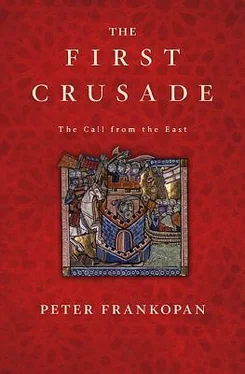Like Plastencia and Tarsos, Edessa was strategically well placed to dominate a wider region and Baldwin’s securing of the town was clearly part of a wider plan. Alexios was building a network of key towns and locations in the east which were held by trusted lieutenants. It was a role that suited Baldwin perfectly. Devout, experienced and capable, the youngest of three brothers whose patrimony had been reduced in the eleventh century, Baldwin had sold almost his entire landholdings before setting off for Jerusalem. He was one of the Crusaders who saw the expedition not only as a pilgrimage to Jerusalem but as offering the prospect of a new life in the east.
Baldwin formally took charge of Edessa on behalf of Constant inople. We can tell this not just from the fact that he started to wear Byzantine clothes and grew his beard in local fashion, but from other more substantial clues. It was striking, for example, that after settling into his position in Edessa, Baldwin took to having two trumpeters ride ahead of him to announce his imminent arrival when touring the region. Baldwin would travel in his chariot, which bore on a golden shield the unmistakable image of the authority with which he acted: the imperial eagle of Constantinople. 63
Baldwin’s appointment as Alexios’ representative in Edessa and the surrounding area was formalised by granting him the official title of doux , governor. This was why Latin sources began to talk of Baldwin in this period as having the rank of duke – a title that he did not hold at home. 64His obligations in Edessa also explain why it was that Baldwin was later reluctant to leave the city and rejoin the Crusade: he had responsibilities that he could not ignore. 65A marriage to the daughter of a local potentate following the death of his English wife Godevere likewise suggests that he was putting down roots. 66In short, he was an excellent choice of lieutenant for Alexios in his ambitious and extensive plan to recover the Byzantine east.
While Baldwin was making headway in extending the emperor’s authority, the rest of the Crusader army continued east. In October 1097, they finally arrived at the great city of Antioch. The city was not only strongly defended but well located: set back against mountains on two sides, with the river Orontes to the west serving as a further obstacle, Antioch was protected by walls twenty metres high and two metres thick, with numerous towers offering full sight of any hostile activities below. 67
It was not just the physical location and the defences of Antioch that were a cause for concern; so was its size. The circuit of walls stretched for five kilometres around the city, encompassing an area of some 1,500 acres. As one observer put it, as long as the inhabitants were supplied with enough food, they would be able to defend the city for as long as they liked. 68In so large a city, enough could be grown within its walls to sustain it almost indefinitely.
Antioch’s governor, Yaghi Siyan, was so confident about the city’s defences that he did little to oppose the expedition when it arrived. This gave the knights precious time to survey the city properly and regroup following the long march. Moreover, the Crusaders reached Antioch at a favourable time of year, when the scorching heat of the summer had dissipated and food was in plentiful supply. They were delighted to find ‘fruitful vineyards and pits full of stored corn, apple trees laden with fruit and all sorts of other good things to eat’. 69
To start with, there was a curious normality about the scene. Those in the city went about their business seemingly unworried about the presence of a major army outside the walls; and those who had come to attack it set about making plans, oblivious to the perils and strains which lay ahead. As the chaplain of Raymond of Toulouse wrote wistfully, at the beginning the westerners ‘ate only the best cuts, rump and shoulders, scorned brisket and thought nothing of grain and wine. In these good times, only the watchmen along the walls reminded us of our enemies concealed inside Antioch.’ 70
The Crusaders established themselves in the surrounding area, taking the city’s port at St Simeon to open up supply lines by sea to Cyprus, where a new Byzantine governor had recently been appointed, after the restoration of Alexios’ authority there, to oversee provisioning of the knights. 71As Tarsos and other coastal towns had been captured already, there was little disruption to maritime traffic, either from Cyprus or elsewhere.
The Crusaders now tried to impose a blockade on Antioch.
Although this initially affected the price of goods in the city, its geography and scale made it all but impossible to seal off completely. As a Muslim chronicler noted, ‘oil, salt and other necessities became dear and unprocurable in Antioch; but so much was smuggled into the city that they became cheap again’. 72
The ineffectiveness of the siege was one thing; the other problem was that living conditions soon deteriorated for the attackers. Finding enough food and pasture was a problem for any besieging force tackling a large target. Maintaining a single horse could require between five and ten gallons of fresh water per day, as well as a good supply of hay, and plenty of pastureland. It is difficult to estimate the precise number of horses outside Antioch, but there would have been thousands, with leading aristocrats having brought several mounts with them. The cost and practicalities of keeping so many horses supplied, to say nothing of those who rode them, was substantial.
Ominously, supplies started to run out a few weeks after the army’s arrival at Antioch. The land that had been so pregnant when they reached the city was quickly stripped bare. By the end of the year, conditions became atrocious. As Fulcher of Chartres reported: ‘Then the starving people devoured the stalks of beans still growing in the fields, many kinds of herbs unseasoned with salt, and even thistles which because of the lack of firewood were not well cooked and therefore irritated the tongues of those eating them. They also ate horses, asses, camels, dogs and even rats. The poorer people ate even the hides of animals and the seeds of grain found in manure.’ 73
By mid-November, those leaving the safety of the camp to seek food – or for other reasons – ran serious risks. One young knight, Abelard of Luxemburg, ‘a very high-born young man of royal blood’, was found ‘playing dice with a certain woman of great birth and beauty in a pleasure garden full of apple trees’. He was ambushed and beheaded on the spot; his companion, seized by Turks, was repeatedly violated and also decapitated. The heads of both were then catapulted into the Crusader camp. 74The Turks demonstrated their confidence no less forcefully by hanging John the Oxite, the patriarch of Antioch, upside down over the walls, beating his feet with iron bars in sight and within earshot of the western army. 75
Food shortages were soon followed by disease. According to one chronicler from Edessa, as many as one in five of the Crusaders died outside Antioch from starvation and illness. 76Infection raged through an increasingly malnourished and enfeebled force which was camped close together. Water carried deadly typhus and cholera bacteria. Tents rotting from the endless rain did nothing to improve morale or to stem the spread of disease. 77
The situation worsened further when a large army under Duqaq, the emir of neighbouring Damascus, moved to relieve Antioch shortly after Christmas 1097. By a stroke of good fortune, the advancing force was spotted by Bohemond and Robert of Flanders who were on a foraging mission, and decided to engage the enemy. Vastly outnumbered, the western knights held rank and managed to avoid being encircled by Duqaq’s men by breaking through enemy lines. 78The Crusaders’ resistance had a surprising effect on Turkish morale. Duqaq had made for Antioch expecting to finish off a weakened and exposed western army. But Bohemond and Robert of Flanders had shown formidable determination and discipline when they came under attack, which startled the governor of Damascus and his men. Rather than continue on to Antioch, to the westerners’ great surprise Duqaq decided to return home. The first major Muslim army to attack the Crusaders at Antioch had folded at the first opportunity.
Читать дальше











